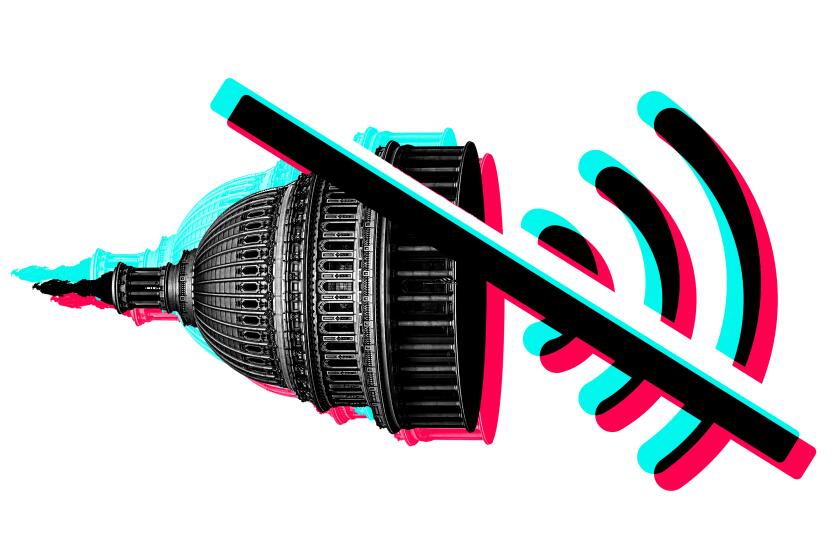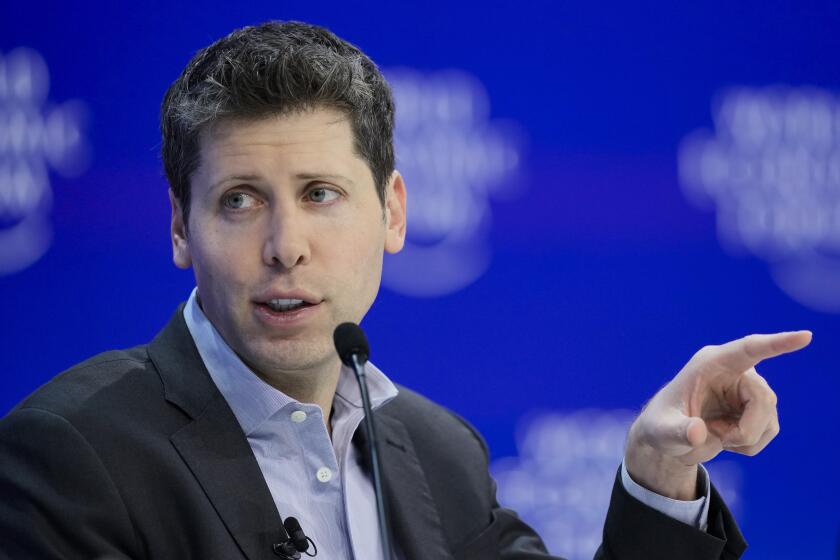Universal Music Group artists dancing back to TikTok after licensing dispute resolved

- Share via
TikTok may be facing a countdown that could lead to its ban in the United States, but the hugely popular social video platform has managed to put at least one significant controversy behind it.
On Wednesday night, TikTok and Universal Music Group, the world’s biggest recorded music company, announced a new licensing deal that will return some of music’s biggest performers and their songs to the platform.
The companies said the new deal improves compensation for Universal Music Group songwriters and artists, whose music is used to accompany videos on the app.
Under the new agreement, the companies will also work to increase e-commerce opportunities for artists, among other efforts to help musicians make money on TikTok. ByteDance-owned TikTok said it is committed to removing unauthorized music generated by artificial intelligence on its platform.
The licensing deal ends a dispute that roiled the music industry and began in late January when the last deal expired. UMG said that TikTok was not paying “fair value for the music,” while TikTok accused UMG of putting “their own greed above the interests of their artists and songwriters.”
Congress passed a bill that could ban TikTok. What could happen next, and who might buy the social media platform?
Amid the rancor, music by Universal Music Group artists including Taylor Swift, Billie Eilish, Olivia Rodrigo and Ice Spice vanished from TikTok. Songs placed on existing videos were muted.
The tunes were made unavailable to more than 1 billion people globally who use the app — a key platform where musicians promote their songs to fans.
The standoff appeared to ease last month after UMG’s biggest artist — Swift — allowed her songs to play on TikTok before the release of her new album, “The Tortured Poets Department.”
Now that a deal has been reached, UMG artists will see their music return in one to two weeks. Videos that were muted will be unmuted, according to TikTok.
“Music is an integral part of the TikTok ecosystem and we are pleased to have found a path forward with Universal Music Group,” Shou Zi Chew, TikTok’s chief executive, said in a statement. “We are committed to working together to drive value, discovery and promotion of all of UMG’s amazing artists and songwriters, and deepen their ability to grow, connect and engage with the TikTok community.”
UMG executives said Thursday that the company received more compensation in the new agreement compared with the previous one, but didn’t disclose the financial terms on an earnings call with investors.
They said other aspects of the deal, including those involving e-commerce, marketing campaigns, ad credits and data insights, will create new revenue lines for musicians.
TikTok and UMG also have agreed to work together to remove unauthorized AI-generated music on the app.
AI is a significant concern in the entertainment industry because of the proliferation of videos or audio generated by AI that depict Hollywood talent doing activities they did not do or authorize. Another fear is the effect AI could have on jobs and how art is created.
“It’s important to look at the TikTok relationship reset holistically,” Michael Nash, chief digital officer and executive vice president at Universal Music Group, said on the earnings call.
The agreement comes as TikTok is working to assure creators and users of its popular social video service that it is not going anywhere, despite government actions to ban it.
TikTok’s Chinese parent company faces pressure under a new law to sell TikTok’s U.S. operations in 180 days, or else the app will be banned here.
TikTok said it plans to contest the law in U.S. court.
After UMG pulled its catalog from the app and as political pressure - or even a domestic ban - threatens its viability, artists and their creative and business teams are pondering a world without it.
TikTok has been an important avenue for music artists to reach their fans and market their music, alongside streaming services such as Spotify.
“I’m so excited to have my music more available and accessible again,” said Blu DeTiger, a Capitol Records artist whose LP “All I Ever Want Is Everything” came out in March.
She had cultivated a big TikTok audience for her virtuosic bass playing (she’s performed with Olivia Rodrigo and Bleachers), and is glad to have the platform back to promote her solo material.
“I received many messages from my fans who were frustrated that they couldn’t find the music on Tik Tok,” she said. “Knowing that they’ll be able to start using the new songs in their videos to express themselves again is so exciting to me. For a new artist like myself, it’s so important that my music is on there to be discovered by new people.”
TikTok is just one of many platforms that help market music. Artists also use Google’s YouTube Shorts and Meta’s Instagram Reels for similar purposes. As TikTok’s future in the U.S. faces uncertainty, some creators have diversified where they place their content to other platforms.
“So while this development feels like a return to course, the industry has had a significant period of discovery showing that TikTok is just one player in [user-generated content’s] complex, but influential landscape,” Simon Friend, chief operating officer of digital agency Round Group, said in a statement. The company specializes in music marketing and its clients include major record companies.
Washed Out is the first major music artist to commission a music video using OpenAI’s Sora text-to-video technology.
Times staff writer August Brown contributed to this report.
More to Read
Inside the business of entertainment
The Wide Shot brings you news, analysis and insights on everything from streaming wars to production — and what it all means for the future.
You may occasionally receive promotional content from the Los Angeles Times.














